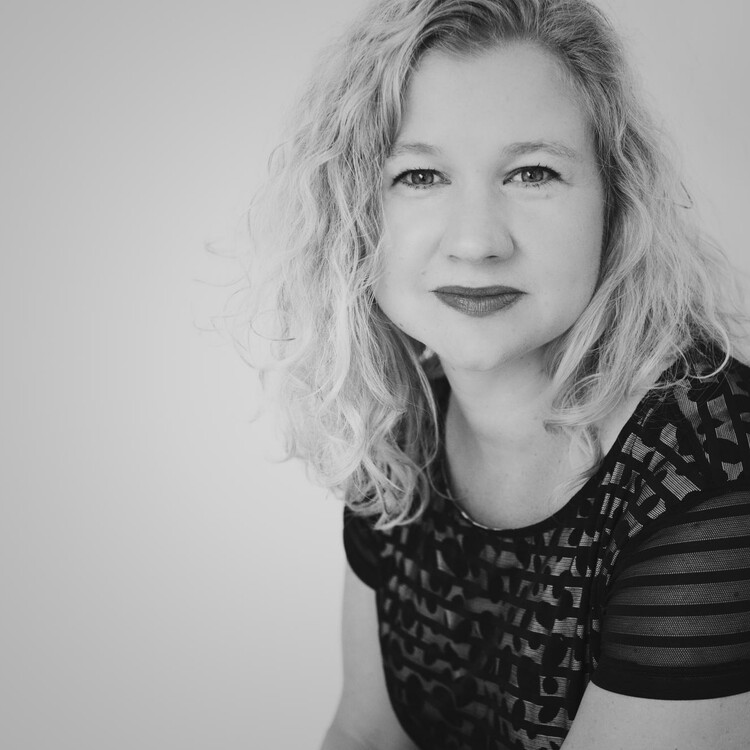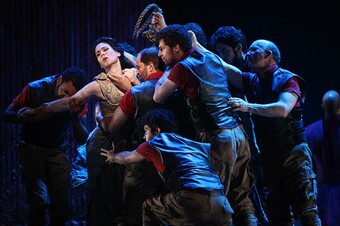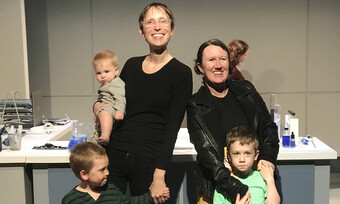Parenting and Playwriting
In the Back Row
This post is part of a regular series on Parenting & Playwriting. If you have a topic you’d like me to address, contact me at [email protected].
A couple of months ago, HowlRound hosted a discussion about parenting and theater on Twitter, and perhaps the most interesting question to emerge from the discussion was simply: Should I bring my kid to rehearsal?
When I was a graduate student, I shared an office with four other colleagues, all at various points in the program, some just beginning their coursework, others trudging through their dissertations. We all had more in common than not; only a narrow slice of humanity has any interest in pursuing a PhD in theater, except for one colleague who stuck out like a sore thumb. She had a baby. And this was a difficult fact to forget, because she often brought said baby to work with her. At first it was a sweet novelty—hey, look, at the chubby, cute, powder-smelling baby. People would stop by the office and croon. It was like having a popular mascot around, and it was nice. Until it wasn't. Because, of course, babies whimper and cry and in general like to draw a lot of attention to themselves (total divas), which makes concentrating on grading papers, writing papers, and research difficult.
Eventually one of my office mates complained (not me, I swear!), and the young woman was asked by the head of the department to cease bringing her baby to the office, which she did. We were all relieved, although a thin layer of ice grew between her and the three of us. In fact, she stopped working in the office much at all.
A couple of years while teaching at another school, an ice storm hit the area, knocking out the power for many people. The elementary and secondary schools in the county closed as a result, while the large university, on a different grid, stayed open. A young assistant professor, who was a single mom, brought her child into work with her. She set her up in front of a portable television (this was before the age of iPads) in her office, which she did not share with anyone else. The child spent the day quietly watching her shows and drawing, and when her school reopened the next day, she was gone. Yet once again, someone complained, or perhaps it was at the whim of the department head, I don't really know, but the young assistant professor was told that the department had a "no children" policy. Despite having been relieved when my office partner was told to leave her child at home, I felt quite indignant on behalf of this single mother, whose child had been well behaved and unobtrusive.
When my first child was young enough to still be nursing, I brought her to a far-flung city with me for the opening of a play. It was our first preview, and the baby needed feeding just as the production began (of course), so I snuck her into the back of the theater and fed her, while I watched the play. She made little squeaky, gurgling noises, as I recall, but no crying or whining or other disruptive noises, and I sat in on the end of the row by the door, far from the rest of the audience, ready to make a quick exit, if necessary. After the first scene, the house manager tapped me on the shoulder and asked me to take the baby out of the theater, as one of the actors had complained.
In retrospect, I don't think I would make that choice again. I think it probably was disrespectful to bring a baby into the house, even a quiet one, when the actors were performing in front of an audience for the first time. Had it been a run-through post-tech to an empty house, I doubt I'd feel so abashed.
There's obviously a balance to be found between respecting the needs of parents in times of emergency or early infant dependency and the actual work that everyone has gathered to do. I don't know what that balance is, however, or if it's even possible to systematize it, but I'd love to hear your thoughts. Have you ever brought your kids to rehearsal? Have you ever regretted it?







Comments
The article is just the start of the conversation—we want to know what you think about this subject, too! HowlRound is a space for knowledge-sharing, and we welcome spirited, thoughtful, and on-topic dialogue. Find our full comments policy here
I brought my baby to a production meeting when she was 5 months old and it went well. (We were lucky she was a pretty easy baby.) Around the same time, she sat through a reading of my play and artist talk at DePaul University. My husband held her in the back. She chimed in with baby babble and no one seemed to mind. (I had okay-ed with the professor.) Then... a few months ago, we had no choice but to bring her to rehearsal. At 14 months, it was a disaster! My husband and I are working on a project that I'm writing and he's directing. Toddler and I had to flee the scene as fast as we could, so he, the cast and dramaturg could work. It's tough when dealing with a toddler. We learned that we no longer could bring her to work with us, even in emergency situations. Now we have planning meetings to talk about the script and baby sitting strategy. We have a three week rehearsal period coming up, so we had to get creative with the babysitting. I think we have it under control. (Keeping fingers crossed. It's harder when you don't live near family, don't make tons of money, and are building trusted sitters. Not to mention a husband and wife team working together in theater.)
Thanks everyone for chiming in. I think the difficulty with this issue is that common sense dictates that decisions be made on a case by case basis, which is tricky territory for institutions, in particular. On a lighter note, I was part of a rehearsal process once where the director brought her dog to rehearsal who then subsequent peed on the set. Angry designers!
Also as an Assistant Stage Manager in a previous life, I often managed actors' children so they could watch their parents work and as long as the kids were well-behaved, I loved it.
I've been on both sides of the equation. I had an actress bring a nursing baby to rehearsal, it was fine, he slept all the time, she pumped during notes sessions. (But it was a shorter rehearsal process and it wasn't everyday.) And I brought my nursing child to some rehearsals. But I wouldn't have brought her to a run through. Actors need to concentrate when they are getting off book and no matter how good my baby was, she would not be quiet for an hour and a half. And I do think that you have to listen to your collaborators, if they don't like it, the baby goes. (the same for dogs in the rehearsal room! I don't mind a well-behaved dog in the rehearsal room but some people might, and they have the right to say no.) when my son was 1.5, I worked on a play with Children's Theater Company and that was the way to go! I was asked a lot, "why don't you bring him in more?" But I knew sometimes it would affect MY work, so I didn't bring him. But he loved tech! And was welcome there.
I once had a director bring her 4th grader to rehearsal--child care fell through. It was perfectly fine, until the director used the F word and a small, chiding "Mom!" came from the back row. Oops. Keep it clean people! The fact is, taking care of children comes with certain non-negotiables. If your arrangements fall through, you do not have the option to leave that kid at loose ends. That said, consistently having kids in a rehearsal room is going to have a real effect on the working environment, and any parent/collaborator better think long and hard about making that choice. I'm thinking of one of my plays that is NOT child-friendly--I would not be comfortable with a kid in rehearsal for that one. Another one? Sure! And my TYA work? Might even benefit.
I feel fortunate that I had the ability to bring my children as infants to rehearsal when I neede to. Our wonderful company embraced them and became extended family.
When they were older and babysitter fell thru hours before curtain, there was no choice and along they came. Because this was their life as much as mine, they understood how to behave backstage. The show must go on.
Make no mistake, the working theater mom feels terrible and outcast and miserable when struggling with balance it all. But isn't theater about humanity?
Surprising how un- family-friendly the theater world can be despite how 'progressive' we are.
Oh my good goodness. i have encountered the dilemna of having/bringing the child to the office/work/classroom and the theatre/rehearsal/performance -- you know what?// there are always things to complain about : our particular lives are fraught with intangible upsets... oh my I was annoyed and couldn't share the space with that unnerving little (fill in the the blank) who has not been on a plane with the three screaming infants right behind your seat.
How tolerant or intolerant can we see ourselves - outside of the immediate experience of discomfort. It doesn't last forever - while this "THING" that I am doing will be shared and lauded by the universe. it takes some age and distance to recognize that breast feeding, child care and circumstances beyond our control necessitate the inclusion of generational patience. What about SENIORS - are they allowed in the graduate space or the back of the theater with their questions, and noisy rustling? sorry the for the rant, but I took my son, in a MOSES basket, to rehearsals consistently. After the initial "what a great kid, he's so well behaved, nice to have this energy in the room" speeches, we adapted to his screaming, burbling and distracting behaviour. BRING the kids, (people bring their animals recently and that seems to be alright??) and they will grow up to understand where it is that we work, play and live.
Bringing animals is not all right. Many people have issues with being forced to be in a room with animals, especially large dogs. Like it or not children are a distraction. I had three and worked a variety of schedules and jobs. If you are resourceful enough to write or perform, you are resourceful enough to arrange for child care. Bringing the pets or kids may be good for them or you, but it is usually not good for at least some of the people you work with.
and SCENE... everyone has family experience and expectations, and the THEATRE family is as wide and varied as the world experience we reflect.